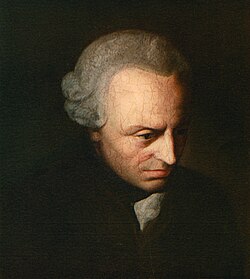
Ethical idealism,[1] which is also referred to by terms such as moral idealism,[2][3] principled idealism,[4] and other expressions, is a philosophical framework based on holding onto specifically defined ideals in the context of facing various consequences to holding such principles and/or values. Such ideals, which are analyzed during the process of ethical thinking, become applied in practice via a group of specific goals relative to what has been learned over time about morality. As noted by philosopher Norbert Paulo, following ideals in a doctrinaire fashion will "exceed obligations" put on people such that actions "are warranted, but not strictly required."[5]
With certain philosophical movements throughout history emphasizing various types of moral idealism, such as influences being a part of Christian ethics, Jewish ethics, and Platonist ethics, it relates to human decision making as differing alternatives get compared and contrasted.[1][3] Advocates for ethical idealism, such as the philosopher Nicholas Rescher, have asserted that inherent mental concepts shared in terms of the human condition among multiple peoples have a real, tangible nature due to their influences turning logical thinking into action, particularly by stimulating peoples' sense of motivation.[1] In contrast, skeptical philosophers, such as the philosopher Richard Rorty, have argued that the complex course of recorded history has shown that "to do the right thing is largely a matter of luck" and particularly is due to "being born in a certain place and a certain time."[3]
- ^ a b c Cite error: The named reference
Nicholaswas invoked but never defined (see the help page). - ^ Perry, Ralph B. (1909). The Moral Economy. Charles Scribner's Sons. pp. 251–252.
- ^ a b c Cite error: The named reference
Rortywas invoked but never defined (see the help page). - ^ "How to avoid career politicians". Adam Smith Institute. November 15, 2010. Retrieved May 12, 2024.
- ^ Paulo, Norbert (2016). The Confluence of Philosophy and Law in Applied Ethics. Springer Publishing. pp. 120–122. ISBN 9781137557346.